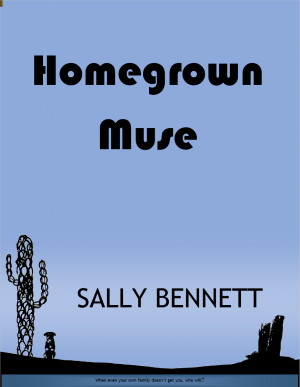Location: United States
Member Since:
April 30, 2011
Sally Bennett Boyington
Biography
I've been addicted to creative writing since my first publication of a poem at the ripe age of seven. After some attempts to kick the habit in my early college years, I wound up majoring in creative writing. Finding my own voice took longer: was I to be a writer of short stories or poems, of articles in popular magazines or professional journals, of novels or scholarly tomes?
For a while, making a living with copyediting took priority, but I'm now able to publish my own writing. Some of the manuscripts are new, while others I put away for several years before pulling them out of the closet and dusting them off.
For a while, making a living with copyediting took priority, but I'm now able to publish my own writing. Some of the manuscripts are new, while others I put away for several years before pulling them out of the closet and dusting them off.
Where to find Sally Bennett Boyington online
Website: http://www.wordsmithpages.com
Facebook: Facebook profile
Blog: http://wordsmithpages.com/wordpress/
Facebook: Facebook profile
Blog: http://wordsmithpages.com/wordpress/
Books
Homegrown Muse
by Sally Bennett Boyington
Price:
$2.99 USD.
Words: 99,380.
Language:
English.
Published: June 9, 2011
.
Categories:
Fiction » Literature » Literary, Fiction » Women's fiction » General
(4.00 from 1 review)
In this controversial novel, you'll meet Lyssa Smith, a woman trying to maintain a code of ethics in the cutthroat business of land development. When she stands up to a greedy developer, the truth about her offbeat family comes out, shattering her veneer of normalcy—and her dreams for the future. Her best chance to remake herself lies with Dane Callicott, a man with secrets of his own.
Sally Bennett Boyington's tag cloud
Smashwords book reviews by Sally Bennett Boyington
-
Waking the Stones
on Sep. 12, 2011
A technothriller with a nebulous ending, this first-person story puts you in the head of an ordinary man caught up in extraordinary circumstances. Midway over the Atlantic on his way to England, a Canadian vacationer meets a redhaired goddess worshiper, and his life takes an abrupt turn for the interesting. From encountering escaped elephants at Stonehenge to uncovering a plot to manipulate people’s emotions via frequencies broadcast under the guise of pest control, Ty and Jen take it all in stride. Ty, a suspicious but otherwise average fellow, first has his attention caught by Henry the pink ferret and then takes notice of Henry’s handler, Joe, a technician who seems out of place among his pest-control companions. When people nearby turn into a mob, Ty embarks on a mission to find out why. Eventually, they co-opt Joe to figure out a way to counteract the technology, which he developed (exhibiting the stereotypical scientist’s dissociation from the real-world consequences of his research). With the help of Jen’s New Age comrades, they then harness the positive energy of England’s standing stones and, at least temporarily, defeat the corporate enemy that would exert mind control over the populace. The humor in this book is clever and lighthanded: “Just radiate good thoughts,” Jen tells Ty. The narrator says to us, “I held her hand and radiated.” These humorous elements do much to characterize Ty and simultaneously keep the reader engaged. In combining plot elements derived from both the old (mysticism, standing stones, goddess worship) and the new (high-tech recording and playback, corporate conspiracies, military technology), this intellectual novel intrigues and fascinates without resorting to the gore and elevated horror that drive so many thrillers. The first-person voice is sometimes a little distracting, with sentence fragments and stream of consciousness, in addition to jumping levels of psychic distance, but these drawbacks are standard with this point of view, and the author handles the narration well for the most part. The internal thoughts tend to drive the plot more than hardcore action or dialogue, because everything is experienced through Ty’s perceptions. ****** Editorial quibbles for those who care about such things: the practice of minimizing punctuation marks is taken a little too far in this book. For example, where paired commas should appear, there is frequently only one comma; and where a comma would help separate clauses and make for easier reading, no comma is provided. This, along with the sentence fragments, means that the reader has to work a little harder to follow the story. The Canadian British spellings are consistent and correct, but Americans will have to adjust to them. (Disclaimer: I received a free copy of this book to review.)

